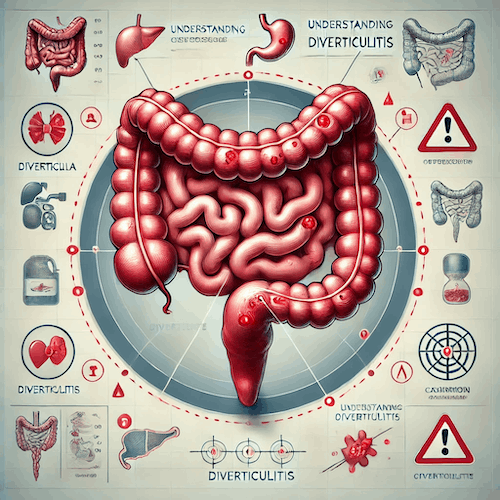Diverticulitis is a common digestive condition that occurs when small, bulging pouches (diverticula) in the digestive tract become inflamed or infected. These pouches most often develop in the colon, particularly in the sigmoid colon. While many people have diverticula without issues (diverticulosis), when these pouches become inflamed or infected, it leads to diverticulitis.
Understanding the risks associated with diverticulitis is crucial for prevention and early intervention. Several factors can increase one's likelihood of developing this condition:
Age: The risk of diverticulitis increases significantly with age, particularly after 40. By age 60, about half of all people have diverticula, though not all will develop diverticulitis.
Diet: A low-fiber diet is strongly linked to an increased risk of diverticulitis. Fiber helps soften stool and promotes regular bowel movements, reducing pressure in the colon.
Obesity: Carrying excess weight, especially around the midsection, can increase the risk of diverticulitis.
Lack of exercise: A sedentary lifestyle is associated with a higher risk of diverticular disease.
Smoking: Tobacco use can weaken the lining of the colon and increase the risk of complications.
Certain medications: Regular use of nonsteroidal anti-inflammatory drugs (NSAIDs), steroids, and opioids may increase the risk.
Genetics: There appears to be a hereditary component to diverticular disease, suggesting some people may be genetically predisposed.
Complications of diverticulitis can be serious and may include:
Abscesses: Infected pockets of pus that form around the inflamed diverticula.
Peritonitis: If an inflamed diverticulum ruptures, the infection can spread into the abdominal cavity, causing a potentially life-threatening condition.
Fistulas: Abnormal connections between the colon and other organs or the skin.
Intestinal obstruction: Scarring from diverticulitis can lead to blockages in the colon.
Bleeding: While more common in diverticulosis, severe bleeding can occur in diverticulitis.
To reduce the risk of developing diverticulitis, individuals should:
Adopt a high-fiber diet rich in fruits, vegetables, and whole grains.
Stay hydrated by drinking plenty of water.
Exercise regularly to maintain a healthy weight and promote good digestive health.
Quit smoking and limit alcohol consumption.
Manage stress through relaxation techniques or counseling.
Avoid regular use of NSAIDs if possible.
Get regular check-ups, especially if you have a family history of diverticular disease.
Understanding these risk factors and taking proactive steps can significantly reduce the likelihood of developing diverticulitis and its complications. If symptoms such as persistent abdominal pain, fever, or changes in bowel habits occur, it's important to seek medical attention promptly for proper diagnosis and treatment.

